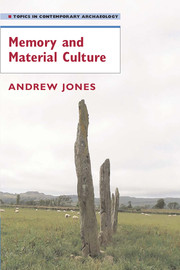Book contents
- Frontmatter
- Contents
- Preface
- 1 Memory and Material Culture?
- 2 From Memory to Commemoration
- 3 People, Time, and Remembrance
- 4 Improvising Culture
- 5 Continuous Houses, Perpetual Places: Commemoration and the Lives of Neolithic Houses
- 6 Culture, Citation, and Categorisation: Regionality in Late Neolithic Britain and Ireland
- 7 Chains of Memory: The Aesthetics of Memory in Bronze Age Britain
- 8 The Art of Memory: Memory, Inscription, and Place
- 9 Tracing the Past: Landscape, Lines, and Places
- 10 Coda
- References
- Index
4 - Improvising Culture
Published online by Cambridge University Press: 07 December 2009
- Frontmatter
- Contents
- Preface
- 1 Memory and Material Culture?
- 2 From Memory to Commemoration
- 3 People, Time, and Remembrance
- 4 Improvising Culture
- 5 Continuous Houses, Perpetual Places: Commemoration and the Lives of Neolithic Houses
- 6 Culture, Citation, and Categorisation: Regionality in Late Neolithic Britain and Ireland
- 7 Chains of Memory: The Aesthetics of Memory in Bronze Age Britain
- 8 The Art of Memory: Memory, Inscription, and Place
- 9 Tracing the Past: Landscape, Lines, and Places
- 10 Coda
- References
- Index
Summary
What links together purposive human acts is not the presence of the environment as a continuous adversary, but the network of expectations and retained memories which provides the context for the projecting forward of human agency.
(Thomas 1996a, 37)In Chapter 3, I examined the way in which societies situate themselves in time using material culture. I showed how the materiality of objects is employed to signify qualitative temporal differences. I suggested that these systems of differences are produced and reproduced by the performance of activities which engender an active process of remembrance. I described this process as something akin to literary citation in which the citation of a work both refers to and revitalises its significance. In this chapter, I examine this concept further. I argue that if we accept citation as a useful device for thinking about the relationship between past and present activities, then the concept forces us to rethink how we conceptualise cultural practice more generally. In Chapter 3, I considered the nature of systems of differences synchronically over a single unitary historical period; in this chapter I discuss how the notion of citation helps us think diachronically about the nature of social change. In Julian Thomas's terms, I aim to examine the network of expectations and retained memories which produce the projection forward of human agency.
- Type
- Chapter
- Information
- Memory and Material Culture , pp. 70 - 90Publisher: Cambridge University PressPrint publication year: 2007

